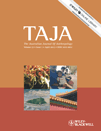
Australian Journal of Anthropology
Scope & Guideline
Advancing the Frontiers of Anthropology
Introduction
Aims and Scopes
- Cultural Anthropology:
The journal focuses on the study of cultural practices, beliefs, and identities, particularly within the context of Australian and Pacific communities, exploring themes such as ritual, kinship, and social hierarchies. - Environmental Anthropology:
There is a significant emphasis on how human interactions with the environment shape cultural practices and social relations, particularly in discussions around ecological crises and multispecies interactions. - Critical Social Issues:
The journal addresses pressing social issues, including gender, race, class, and indigenous rights, providing a platform for discussions on social justice and political activism. - Methodological Innovations:
The Australian Journal of Anthropology encourages innovative qualitative methodologies, including autoethnography and sensory ethnography, to deepen understanding of anthropological subjects. - Interdisciplinary Approaches:
The journal integrates insights from various disciplines, such as sociology, cultural studies, and environmental science, allowing for a richer analysis of anthropological topics.
Trending and Emerging
- Multispecies Anthropology:
An increasing number of papers explore the relationships between humans and non-human entities, emphasizing the importance of ecological relationships and the impact of human actions on other species. - Indigenous Rights and Activism:
Papers focusing on indigenous rights, land politics, and environmental justice reflect a growing commitment to recognizing and amplifying indigenous voices and perspectives in anthropology. - Digital Anthropology:
With the rise of digital technologies, research examining the impact of social media, online interactions, and digital cultures is becoming more prevalent, highlighting new ways of understanding social dynamics. - Transnational Relationships and Migration:
There is a notable trend towards exploring themes of migration, transnationalism, and the complexities of identity in diasporic communities, reflecting broader global movements. - Affective and Sensory Anthropology:
An emerging focus on affective experiences and sensory engagement in anthropological research is gaining traction, allowing for a deeper understanding of lived experiences and emotional connections.
Declining or Waning
- Traditional Ethnography:
While traditional ethnographic studies remain important, there is a noticeable decrease in papers focused solely on long-term fieldwork without integrating contemporary themes or methodological innovations. - Colonial Narratives:
Research centered on colonial histories and their anthropological implications is less frequently published, possibly due to a shift towards more contemporary and relevant socio-political issues. - Generalized Development Anthropology:
There is a waning interest in broad, generalized studies of development practices, with more specific and localized analyses gaining traction instead. - Heteronormative Perspectives:
Themes addressing heterosexual norms and experiences have become less prominent, as the journal increasingly emphasizes diverse sexualities and gender identities. - Focus on Western-centric Issues:
Research that primarily addresses anthropological issues from a Western perspective is declining in favor of more global and inclusive narratives that consider non-Western viewpoints.
Similar Journals
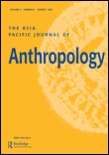
Asia Pacific Journal of Anthropology
Connecting Scholars to the Heart of Cultural StudiesAsia Pacific Journal of Anthropology is a premier academic journal dedicated to advancing the field of anthropology and cultural studies, published by Routledge Journals, Taylor & Francis Ltd. With an ISSN of 1444-2213 and E-ISSN 1740-9314, this journal has gained recognition for its rigorous scholarly contributions since its inception in 2000. Situated in the UK, it is strategically positioned to serve as a vital resource for researchers, professionals, and students exploring the rich complexities of human societies and cultures within the Asia Pacific region and beyond. As evidenced by its Q2 ranking in both anthropology and cultural studies for 2023, alongside its impressive Scopus ranks—#218 among 1304 in Cultural Studies and #157 among 502 in Anthropology—this journal illustrates a strong commitment to delivering high-quality, impactful research. While it is not an open-access journal, it remains a key platform for disseminating innovative research and fostering academic dialogue, thereby significantly contributing to the advancement of knowledge in the social sciences.

DIALECTICAL ANTHROPOLOGY
Illuminating the Nuances of Dialectical ThoughtDIALECTICAL ANTHROPOLOGY, published by SPRINGER, is a prestigious journal within the field of anthropology, recognized for its substantial contributions to dialectical and critical theory in social research. Since its inception in 1975, the journal has carved a niche by exploring the intersections of culture, society, and politics, making it an essential resource for scholars and practitioners. With an impact factor that places it in the Q2 category for both anthropology and arts and humanities, and significant rankings in sociology and political science, it reflects a solid scholarly reputation. The journal operates on a subscription basis, allowing for a wide dissemination of rigorous academic research without open access. With ISSN 0304-4092 and E-ISSN 1573-0786, DIALECTICAL ANTHROPOLOGY serves as a crucial platform for fostering dialogue and advancing knowledge in contemporary anthropology and related disciplines. As a researcher, professional, or student, engaging with the insights presented in this journal will deepen your understanding of the dynamic interplay between structural and agency-oriented perspectives in social contexts.
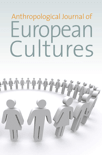
Anthropological Journal of European Cultures
Fostering Dialogue Through Rigorous ScholarshipAnthropological Journal of European Cultures, published by BERGHAHN JOURNALS, is a premier Open Access journal dedicated to the exploration and analysis of cultural dynamics within European societies. With an ISSN of 1755-2923 and an E-ISSN of 1755-2931, the journal has been providing a platform for critical discourse in anthropology and cultural studies since its inception in 2008. Catering to a diverse readership of researchers, professionals, and students, the journal plays a vital role in fostering a deeper understanding of European cultures through rigorous scholarship. It has garnered commendable rankings, including Q3 in Anthropology and Q2 in Cultural Studies for 2023, reflecting its growing influence and quality within the academic community. The journal is committed to Open Access since 2020, ensuring that cutting-edge research is freely available to all, thereby enhancing its reach and impact in the global discourse on culture and anthropology. With its comprehensive and interdisciplinary approach, the *Anthropological Journal of European Cultures* serves as an essential resource for advancing knowledge and promoting dialogue in these dynamic fields.
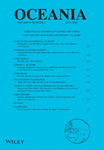
OCEANIA
Fostering Insightful Discourse Across DisciplinesOCEANIA, published by WILEY, is a distinguished journal that has been fostering scholarly discourse in the fields of anthropology and the history and philosophy of science since its inception in 1930. With an impressive impact factor and secure positions in the Q2 quartile for both categories, OCEANIA stands out as an influential resource for researchers and professionals alike. Its latest Scopus rankings reflect its commitment to quality, placing it in the 76th percentile for history and philosophy of science and the 66th percentile for anthropology. Though it does not operate under an open access model, the journal provides robust access options for institutions and individuals to explore its rich array of peer-reviewed articles that contribute to the understanding of cultures and scientific thought across the Pacific region and beyond. As we advance toward its continued convergence into 2024, OCEANIA remains a pivotal platform for innovative research and academic debate, cultivating insights that are crucial for scholars and students navigating the complexities of these interconnected disciplines.
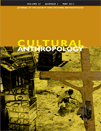
CULTURAL ANTHROPOLOGY
Exploring the Depths of Human CultureCULTURAL ANTHROPOLOGY is a premier journal in the field of anthropology, published by the esteemed SOC CULTURAL ANTHROPOLOGY. With an impressive impact factor and ranking in the Q1 category for both anthropology and arts and humanities, it stands as a leading platform for scholarly discourse and innovative research. Since transitioning to Open Access in 2014, the journal has made substantial contributions to the accessibility of anthropology literature, allowing a broader audience to engage with cutting-edge anthropological insights and findings. The journal's scope encompasses a wide range of cultural studies and anthropological perspectives, catering to a diverse readership that includes researchers, professionals, and students. Published from the Department of Anthropology, Rice University in Houston, Texas, CULTURAL ANTHROPOLOGY continues to shape the conversation in its field, promoting interdisciplinary dialogue and enriching the academic landscape.

Annual Review of Anthropology
Connecting Cultures Through Comprehensive ReviewsAnnual Review of Anthropology is a premier journal published by Annual Reviews, dedicated to providing comprehensive and authoritative reviews in the field of anthropology. Established with the goal of synthesizing essential research findings, this influential publication not only shapes contemporary anthropological discourse but also facilitates interdisciplinary dialogue within the broader realm of social sciences and cultural studies. With an impressive impact factor that places it in the Q1 category across multiple classifications, including Anthropology and Arts and Humanities, this journal is highly regarded by researchers and academics alike. The Annual Review of Anthropology has been a trusted resource for critical insights and transformative ideas, helping to advance the understanding of human societies from 1980 to the present. Although it does not offer open access, access to its articles is available through various academic institutions, ensuring that both seasoned scholars and students can benefit from its wealth of knowledge. With a Scopus ranking placing it in the top percentiles for relevant subjects, this journal is essential reading for anyone looking to stay at the forefront of anthropological research.

Revista Espanola de Antropologia Americana
Engaging Minds in the Study of American SocietiesRevista Española de Antropología Americana, published by UNIV COMPLUTENSE MADRID, SERVICIO PUBLICACIONES, stands as a significant contribution to the field of anthropology, particularly focusing on American societies and cultures. Since its inception in 1970, this journal has evolved, with issues currently being published until 2024, providing a platform for original research, reviews, and scholarly discourse. Despite being a Q3 category journal in the 2023 rankings, it plays a pivotal role in disseminating knowledge and stimulating academic debate within the anthropology community. With an ISSN of 0556-6533 and an E-ISSN of 1988-2718, Revista Española de Antropología Americana strives to engage researchers, professionals, and students with insightful content that reflects the dynamic nature of cultural studies. Although it operates under traditional access models, the rich array of topics covered ensures its relevance to ongoing scholarly conversation in social sciences and anthropology. Addressing a diverse array of anthropological themes, this journal is essential for anyone looking to deepen their understanding of the cultural frameworks shaping American societies.
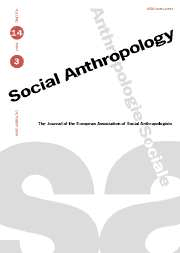
Social Anthropology
Unraveling the Threads of Social PracticeSocial Anthropology is a leading journal published by BERGHAHN JOURNALS, focusing on the diverse and dynamic field of anthropology. With an ISSN of 0964-0282 and an E-ISSN of 1469-8676, this open-access journal has been a cornerstone of scholarly communication since its inception in 1982, becoming fully accessible to the public since 2022. Situated in the United States, the journal aims to disseminate high-quality research that explores sociocultural dimensions of human behavior across various contexts, addressing pressing contemporary issues through a multidisciplinary lens. With impressive rankings, including Q2 in Anthropology and Arts and Humanities, and strong positions in Sociology and Developmental Psychology according to Scopus metrics, Social Anthropology serves as an essential platform for researchers, professionals, and students committed to advancing our understanding of social practices and cultural norms. Its commitment to fostering intellectual discourse makes it a vital resource for those seeking to deepen their knowledge and insight into the anthropological landscape.

Social Analysis
Innovating Dialogue Across DisciplinesSocial Analysis, an esteemed academic journal published by BERGHAHN JOURNALS, is at the forefront of interdisciplinary research, focusing on the dynamic intersections of anthropology, cultural studies, sociology, and the arts and humanities. Since its inception in 2002 and having transitioned to an Open Access model in 2020, the journal ensures that critical social research is widely accessible to scholars and the public alike. With an impressive Q1 ranking in Anthropology and cultural studies and holding a notable Q2 in Sociology and Political Science, it garners attention from a large academic audience, as evidenced by its high Scopus rankings: 10th in general arts and humanities and 153rd in cultural studies. This signifies its influential role in shaping contemporary discourse and providing a platform for innovative ideas and methodologies in understanding social phenomena. Based in Brooklyn, NY, the journal is dedicated to fostering scholarly dialogue and advancing the field, making it an essential resource for researchers, professionals, and students eager to engage with and contribute to the field of social analysis.

Aboriginal Policy Studies
Pioneering Research for Informed Aboriginal PolicyAboriginal Policy Studies is a pioneering open-access journal published by the University of Alberta that has been dedicated to the examination of issues, policies, and practices affecting Aboriginal communities in Canada and beyond since 2011. With its ISSN 1923-3299, this journal serves as a vital platform for researchers, professionals, and students committed to advancing knowledge and understanding of Indigenous rights, governance, and social justice. The journal aims to foster interdisciplinary discourse by publishing high-quality original research, critical analyses, and case studies that address the complexities of Aboriginal policy. Given its commitment to accessibility and rigor, Aboriginal Policy Studies is an essential resource for anyone engaged in the fields of sociology, political science, and Indigenous studies, striving to amplify Indigenous voices within scholarly dialogue.